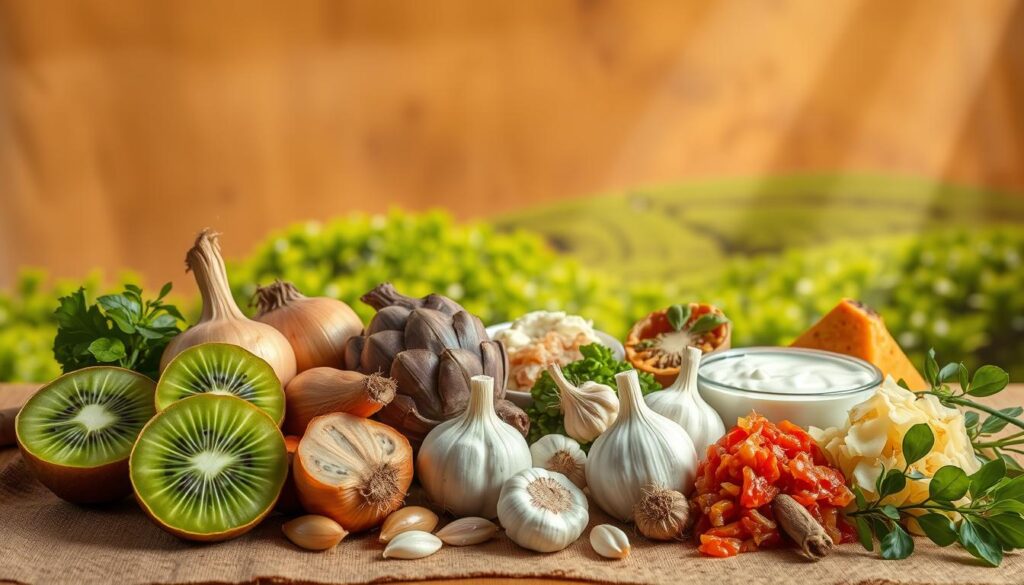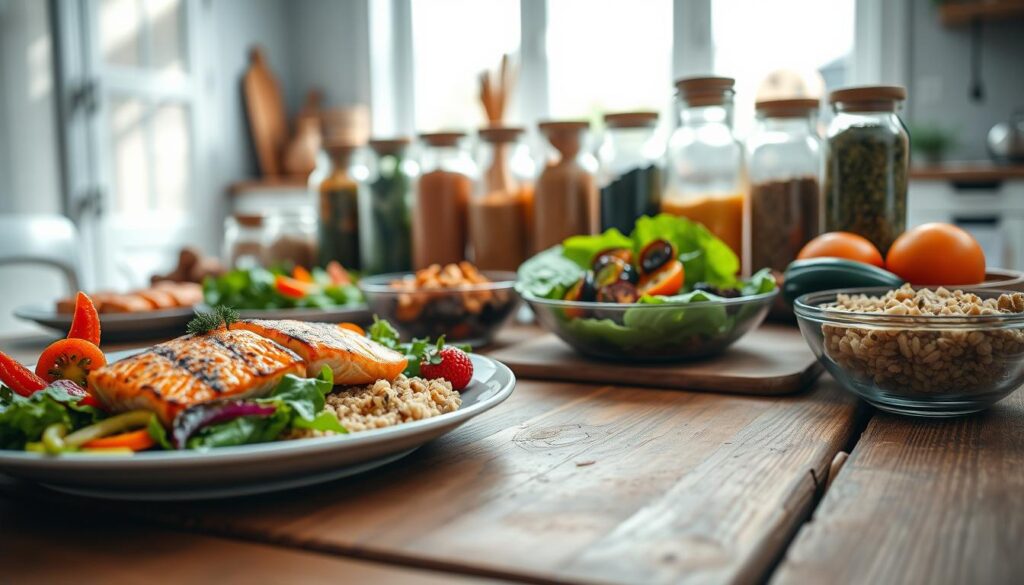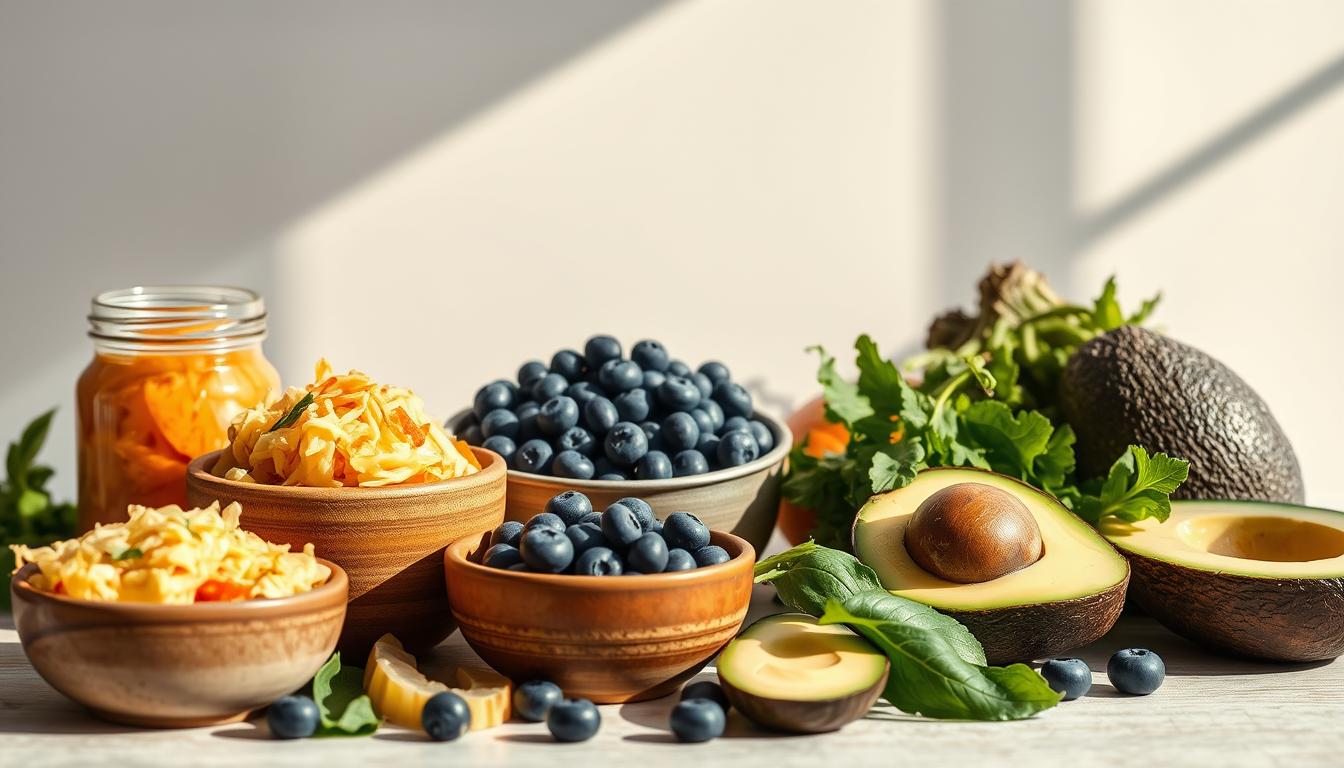Ever thought about how food might help your mental health? The gut-brain axis shows a cool link between what we eat and how we feel. Studies are finding that probiotics and mental health are closely linked, changing how we see food and emotional health.
Our digestive system does more than just break down food. It’s a complex network that affects our brain, mood, and mental health. By picking the right foods, we can boost our mental strength and emotional balance.
This journey into nutritional neuroscience will look at seven foods that can change your mental and digestive health. From fermented foods to superfoods, these choices help support your body’s systems in a holistic way.
Key Takeaways
- The gut-brain axis plays a crucial role in mental health
- Probiotics can positively impact emotional well-being
- Nutrition is a powerful tool for mental health management
- Specific foods can support both digestive and mental functions
- Understanding food’s impact goes beyond basic nutrition
Understanding the Gut-Brain Connection: A Scientific Overview
The link between our digestive system and brain is truly amazing. Our gut-brain axis is a complex network that affects our mental and physical health. Research shows that the diversity of our gut microbiome greatly influences our brain’s function and emotional processing.
Our body has a biological highway where neurotransmitters are made. This system connects our digestive tract and brain, allowing them to talk to each other constantly.
How Your Digestive System Communicates with Your Brain
The gut and brain talk to each other in several ways:
- Vagus nerve signaling
- Hormonal messaging
- Immune system interactions
- Microbial metabolite transmission
The Role of Neurotransmitters in Mental Health
Interestingly, about 90% of serotonin is made in the gut. This neurotransmitter helps regulate our mood. The balance of our gut microbiome affects how we feel, how we handle stress, and our thinking abilities.
Understanding Microbiome Diversity
Microbiome diversity is about the variety and balance of bacteria in our gut. A healthy, balanced microbiome is key for good gut-brain communication. It can help prevent mental health issues and keep our brain healthy.
The gut is not just a digestive organ – it’s a complex ecosystem that plays a fundamental role in our mental health.
Probiotics and Mental Health: The Scientific Evidence
Research has found a link between probiotics and mental health. Studies show that these good bacteria help with anxiety and depression. They work through the gut-brain axis, a key area for mental wellness.
Scientists have found certain probiotic strains that help with mental health. These bacteria interact with our brains in important ways.
- Lactobacillus rhamnosus shows potential in reducing anxiety symptoms
- Bifidobacterium longum helps regulate stress responses
- Lactobacillus helveticus supports mood stabilization
Studies show a strong link between probiotics and mental health. Neuroplasticity and neurotransmitter production are influenced by our gut bacteria.
| Probiotic Strain | Mental Health Benefit | Research Strength |
|---|---|---|
| Lactobacillus rhamnosus | Anxiety Reduction | Strong |
| Bifidobacterium longum | Stress Management | Moderate |
| Lactobacillus helveticus | Depression Support | Promising |
Learning about probiotics could change how we treat depression. The science shows that probiotics might be a new way to help with mental health.
Yogurt: The Ultimate Gut-Friendly Superfood
Yogurt is a top choice for boosting probiotics and mental health. It’s a tasty way to keep your gut and mind healthy. As a fermented food, yogurt has special nutrients that help your gut and brain.
Best Types of Yogurt for Mental Wellness
Not all yogurts are good for your mental health. Look for these types for the best probiotic benefits:
- Greek yogurt with live cultures
- Organic plain yogurt
- Kefir-style yogurt
- Probiotic-rich strained yogurts
Optimal Timing for Consumption
Timing your yogurt can make it even better for your mind. Eating yogurt in the morning or as a mid-morning snack helps keep your mood stable and digestion healthy all day.
| Time of Day | Mental Health Benefit |
|---|---|
| Morning | Mood stabilization |
| Mid-morning | Energy and cognitive support |
| After exercise | Stress reduction |
Combining Yogurt with Other Beneficial Foods
Make yogurt even better by mixing it with other foods. Try these combos for a boost to your gut and brain:
- Yogurt with berries and chia seeds
- Probiotic yogurt topped with nuts
- Fermented yogurt mixed with honey and cinnamon
Selecting the right yogurt can be a game-changer for your mental and digestive health.
Fermented Foods: Beyond Basic Nutrition
Fermented foods are more than just food. They are nutritional powerhouses that support your gut health. Foods like tangy sauerkraut and spicy kimchi offer many benefits. They can improve your digestion and mental well-being.
The fermentation process makes these foods special. It breaks down complex compounds, making nutrients easier to digest. This process also adds healthy probiotics to your diet.
- Sauerkraut: Rich in probiotics and vitamin C
- Kimchi: Supports immune function and reduces inflammation
- Kombucha: Provides antioxidants and promotes gut health
- Miso: Excellent source of protein and beneficial enzymes
Eating a variety of fermented foods boosts your microbiome diversity. This diversity is key to a healthy gut. It also helps with your mental health, improving mood and reducing stress.
Choose fermented foods without added sugars or preservatives. Look for “live cultures” or “unpasteurized” labels for the best benefits. Start with small amounts and gradually increase as your body adjusts.
Kefir: A Powerful Mood-Boosting Beverage
Kefir is a fermented food that links gut health to mental wellness. It’s packed with probiotics, helping both your digestion and mood. Its unique mix of microbes is key to its benefits.
Kefir is a nutritional superstar when it comes to probiotics and mental health. Unlike regular yogurt, it has a wider variety of good bacteria. These can help improve your mood and brain function.
Exploring Kefir Varieties
Kefir comes in two main types, each with its own nutritional benefits:
- Milk Kefir: A creamy, tangy drink rich in protein and calcium
- Water Kefir: A lighter option, perfect for those who avoid dairy
Daily Integration Strategies
Adding kefir to your diet is easy and tasty. Here are some ideas:
- Blend kefir into morning smoothies
- Use as a base for salad dressings
- Enjoy it on its own as a probiotic drink
- Swap yogurt with kefir in recipes
By making kefir a part of your daily routine, you can boost your gut health. This might also improve your mental clarity and emotional balance.
Dark Leafy Greens and Gut Health
Dark leafy greens are nutritional powerhouses that play a crucial role in supporting gut health and mental wellness. These vibrant vegetables are packed with essential nutrients that promote microbiome diversity and support immune system modulation.
Spinach, kale, and collard greens offer remarkable benefits for your digestive ecosystem. They contain unique compounds that help nourish beneficial gut bacteria, creating an environment that supports overall health. The high fiber content in these greens acts as a prebiotic, feeding the good bacteria in your digestive tract.
- Spinach: Rich in vitamins and minerals that support gut health
- Kale: Provides powerful antioxidants that enhance microbiome diversity
- Collard Greens: Supports immune system modulation
- Swiss Chard: Helps reduce inflammation in the digestive system
Scientific research suggests that the nutrients in dark leafy greens can positively impact neurotransmitter production, potentially improving mood and mental clarity.
“Your gut is like a second brain, and dark leafy greens are its best friend.” – Nutrition Expert
To maximize the benefits, aim to incorporate a variety of dark leafy greens into your daily diet. Try adding them to smoothies, salads, or lightly sautéing them as a side dish. Your gut microbiome will thank you for the nutritional boost that supports both digestive and mental well-being.
Experts recommend consuming at least 2-3 servings of dark leafy greens per week to experience their full potential in supporting microbiome diversity and overall health.
Omega-3 Rich Foods for Brain-Gut Harmony
Looking into how food affects our minds shows how important omega-3s are. These fats help our gut and brain work together. They also help with depression and keeping our brain healthy.
Omega-3s are key for our brain and gut health. They help reduce inflammation. This can make our mental and gut health better.
Best Fish Sources for Mental Wellness
Some fish are better than others for omega-3s. Here are the top ones:
- Wild-caught salmon
- Mackerel
- Sardines
- Atlantic herring
- Albacore tuna
These fish have lots of omega-3s. They help our brain and gut talk better. Eating them might make us feel happier and less depressed.
Plant-Based Omega-3 Alternatives
If you don’t eat meat, don’t worry. There are great plant-based options:
- Chia seeds
- Flaxseeds
- Walnuts
- Hemp seeds
- Algae-based supplements
These foods have alpha-linolenic acid (ALA). Our body can turn it into good omega-3s. They help with depression by reducing inflammation and supporting our brain.
Eating these omega-3 rich foods can help our mental health. It also keeps our gut and brain in balance.
High-Fiber Foods That Support Mental Clarity
Dietary fiber is key for mental clarity and well-being. It acts as a prebiotic, feeding good gut bacteria and boosting microbiome diversity. The link between food and thought is deeper than we think.
Fiber-rich foods boost brain function by improving digestion and neurotransmitter production. A healthy gut microbiome greatly improves mental health.
- Whole grains support cognitive function
- Legumes enhance brain connectivity
- Vegetables improve neurological health
Here are some top high-fiber foods for better mental health:
| Food | Fiber Content | Mental Health Benefits |
|---|---|---|
| Lentils | 15.6g per cup | Stabilizes mood, reduces anxiety |
| Chia Seeds | 10.6g per ounce | Supports brain function, reduces inflammation |
| Quinoa | 5.2g per cup | Enhances cognitive performance |
Pro tip: Mix different fiber sources in your diet for better mental clarity. Start small and gradually increase fiber intake to help your body adjust.
“Your gut is like a second brain – nourish it wisely.” – Nutritional Wellness Expert
Choosing high-fiber foods benefits your digestive system and mental health. The connection between gut health and brain function is fascinating. It offers insights into natural ways to regulate mood.
The Power of Prebiotic Foods

Prebiotics are key for better mental health by improving the gut microbiome. These plant fibers feed good bacteria, helping with mood and brain function.
They help by feeding the good bacteria in our gut, which is linked to our mental health. This connection is why researchers are so interested in how our gut and brain work together.
Top Prebiotic Sources for Mental Wellness
Here are some top prebiotic foods for your mental health:
- Garlic – Rich in inulin, supports beneficial bacteria growth
- Onions – Packed with prebiotics that enhance gut health
- Bananas – Contain resistant starch that feeds good gut bacteria
- Jerusalem artichokes – Exceptional source of gut-friendly fibers
- Asparagus – Provides nutrients that boost mental clarity
Synergistic Power of Prebiotics and Probiotics
Using both prebiotics and probiotics is a strong way to improve mental health. Prebiotics act like fertilizer for the good bacteria from probiotics. This combo can help with mood, stress, and overall mental health.
Gut health is the cornerstone of mental well-being, with prebiotics playing a critical role in maintaining this delicate balance.
Plan your meals to get the most from prebiotics for mood. Try to eat foods rich in both prebiotics and probiotics. This will help your mental and digestive health.
Ancient Grains for Modern Mental Health
Exploring ancient grains can change how you think about mental health and food. These foods are not just for eating; they help your brain and gut feel better.
Grains like quinoa, amaranth, and millet are packed with nutrients. They are different from regular grains because they have more complex nutrients. These nutrients are good for your brain and stomach.
- Quinoa: Rich in protein and essential amino acids
- Amaranth: Supports brain health with magnesium and antioxidants
- Millet: Provides sustained energy and promotes gut balance
Adding these grains to your diet can make a big difference. Everyone reacts differently to food. So, ancient grains are great for making your diet fit your mental health needs.
Here are some tips to get the most out of these grains:
- Rinse grains thoroughly before cooking
- Experiment with different preparation methods
- Combine with probiotic-rich foods for enhanced gut support
Pro tip: Start with small portions and observe how your body responds to different ancient grains.
Nuts and Seeds: Brain-Boosting Powerhouses
Discovering the power of nuts and seeds can change your mental health. These small wonders are full of nutrients that boost brain health and overall well-being.
Personalized nutrition is key to finding the right nuts and seeds for you. Each type has special nutrients that help your brain and emotions.
Optimal Daily Portions for Mental Wellness
Finding the perfect amount of nuts and seeds is important. Here are some daily amounts:
- Almonds: 1 ounce (about 23 nuts) daily
- Walnuts: 1-2 ounces per day
- Pumpkin seeds: 1/4 cup daily
- Chia seeds: 1-2 tablespoons
Best Times to Consume for Maximum Benefits
Eating nuts and seeds at the right time can help reduce anxiety. Here’s when to eat them:
- Morning: Sprinkle seeds on breakfast for sustained energy
- Mid-morning: Handful of nuts as a brain-boosting snack
- Pre-workout: Small portion for mental clarity
- Evening: Light nut consumption to support relaxation
Keep in mind, everyone reacts differently to nuts and seeds. Talking to a nutritionist can help create a plan that fits your mental health needs.
Creating a Mental Health-Focused Meal Plan

Creating a meal plan for gut-brain axis health needs careful thought and personal attention. My strategy is to make a flexible meal plan that helps both your mind and stomach.
When making your gut-brain axis meal plan, consider these important points:
- Know what nutrients you need
- Add foods rich in probiotics and prebiotics
- Keep your nutrient intake balanced all day
- Watch how your body reacts to different foods
Here’s a daily meal plan to boost your mental health through food:
| Meal | Recommended Foods | Gut-Brain Benefits |
|---|---|---|
| Breakfast | Greek yogurt with berries | Probiotic support, antioxidants |
| Mid-Morning | Kefir smoothie | Microbiome diversity |
| Lunch | Salmon with leafy greens | Omega-3, fiber intake |
| Afternoon Snack | Nuts and seeds | Brain-boosting nutrients |
| Dinner | Fermented vegetables | Digestive system support |
Remember, personalized nutrition is about listening to your body and making choices that support your mental and digestive health.
Common Mistakes to Avoid When Eating for Gut Health
Keeping your gut healthy is more than picking foods at random. Many people unknowingly harm their gut health with bad diet choices. These choices can hurt their overall health.
Here are some big mistakes to watch out for:
- Overrelying on a single probiotic source
- Consuming excessive processed foods
- Ignoring fiber intake
- Neglecting immune system modulation through diet
Many people think probiotic supplements are enough. But they’re not a substitute for a healthy diet. True gut health comes from eating a variety of foods that are good for your gut.
| Mistake | Potential Consequences | Recommended Solution |
|---|---|---|
| Limited Food Variety | Reduced Bacterial Diversity | Eat Wide Range of Fermented Foods |
| High Sugar Consumption | Disrupted Gut Bacteria Balance | Choose Low-Glycemic Alternatives |
| Antibiotic Overuse | Compromised Immune Function | Consume Probiotic-Rich Foods |
Getting your gut health right means understanding that diet is a holistic approach. Aim for a balanced diet that boosts both your gut health and immune system.
Tracking Your Progress: Mental and Digestive Wellness
Watching your gut and mental health journey needs careful watching and patience. Making diet changes for less anxiety and depression is a big step. It asks for steady tracking and knowing yourself well.
Tracking your progress means noticing small changes in how you feel and your body. What you eat is very important for your health. So, it’s key to see when things get better.
Signs of Improved Gut Health
Seeing good changes in your stomach can tell you a lot about your health:
- Regular and easy bowel movements
- Less bloating and stomach pain
- More energy
- A more steady appetite
Mental Health Indicators to Monitor
Getting better with depression and anxiety shows in different ways:
- More stable mood
- Better sleep
- Being able to handle stress better
- More motivation and interest in things
I suggest keeping a food and mood journal to track these changes. Writing down your daily feelings and what you eat can show how they connect.
Remember, big health changes take time. Being patient and keeping a close eye on your body’s responses is important.
Conclusion
Exploring the gut-brain axis shows us how food affects our mood. Personalized nutrition is more than a trend; it’s a way to understand our body’s needs. It helps us see how diet impacts both our mental and digestive health.
Starting the journey to better health is simple. We can make a difference by choosing foods that boost our gut and brain. Adding probiotics, fiber, and nutrients that support the gut-brain link can really help. Listening to our body and picking the right foods can change our health for the better.
Nutrition is very personal. What’s good for one person might not be the same for another. I suggest trying the foods mentioned, keeping track of how you feel, and adjusting as needed. The gut-brain axis is a powerful system that can be improved with mindful eating.
Our mental and digestive health are closely linked. By using personalized nutrition and listening to our body, we can find better health. This approach can lead to clearer thinking and emotional balance.




